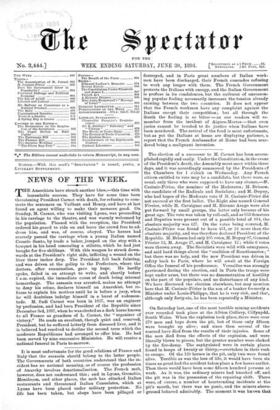The election of a successor to M. Carnot has been
accom- plished rapidly and easily. Under the Constitution, in the event of the President's death, the Assembly must meet within three days, and it was accordingly summoned by the Presidents of the Chambers for 1 o'clock on Wednesday. Any French citizen entitled to vote may be a candidate, but there were, as usual, only three who were supposed to have any chance,—M. Casimir-Perier, the nominee of the Moderates; M. Brisson, the candidate of the Radicals and Socialists; and M. Dupuy, who had hopes of the Moderate vote if M. Casimir-Perier did not succeed at the first ballot. The Right also named General Fevrier, while M. Cavaignac and M. Etienne Arago were also put forward by small groups, the latter only because of his great age. The vote was taken by roll-call, and as 853 Senators and Deputies were present out of a possible total of 881, the absolute majority was 427. On the votes being counted, M. Casimir-P6rier was found to have 451, or 24 more than the absolute majority, and was therefore declared President of the Republic. M. Brisson had only 195 votes, M. Dupuy 97, General Fevrier 53, M. Arago 27, and M. Cavaignac 12 ; while 6 votes were thrown away. The Socialists were wild with annoyance, and said hard things about the " coalition of Reactionaries ; " but there was no help, and the new President was driven in safety back to Paris, where he will await at the Foreign Office the funeral of his predecessor. Versailles was strongly garrisoned during the election, and in Paris the troops were kept under arms, but there was no demonstration of hostility on the part of the populace, and no disturbance of any kind. We have discussed the election elsewhere, but may mention here that M. Casimir-Perier is the son of a banker formerly a Minister under Louis-Philippe, that he is very rich, and that-, although only forty-six, he has been repeatedly a Minister.


















































 Previous page
Previous page